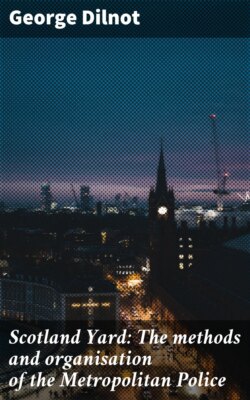Читать книгу Scotland Yard: The methods and organisation of the Metropolitan Police - George Dilnot - Страница 4
На сайте Литреса книга снята с продажи.
TO ROBERT.
ОглавлениеTable of Contents
My Dear Robert,
It is more than probable that since this book was written you have changed your uniform and your beat. You are in the North Sea, in Flanders, in Gallipoli. Nowhere can admiral or general wish a better man.
I have known you long. I have for many years been thrown among you in all circumstances, and at all times. I have known you trudging your beat, have known you more especially as a detective, have known you in high administrative and executive positions. I have seen you arrest armed murderers, have seen you tactfully reproving a drunkard, have seen you solving tangled problems of crime, have seen you charging a mob, have seen you playing with a lost baby. I do not think there is any phase of your work which I have not seen. And I want the public to know you.
You, whether you be Commissioner or constable, occupy a position of delicate and peculiar responsibility. You are poised between the trust and suspicion of those you serve, and you are never quite sure whether you will be blessed or blamed. I, who realise something of your temptations and your qualities, know how seldom you fail in an emergency, how rarely you abuse your powers.
You will forgive me when I say you are not perfect. You have your little failings, and at times the defect of one man recoils on 20,000. There are matters I should like to see changed. But, on the whole, you are admittedly still the best policeman in the world.
The war has claimed you and others of your profession. Astute commanding officers have recognised you as "men who are handled and made," and many a constable of a year ago now wears an officer's stars. There are those of you who have gained other distinctions.
There is no branch of the service here dealt with that has not sent of its best to the fighting line. None will recognise more willingly than you in the trenches that the luck has been yours. We know (you and I) that others have been, by no will of their own, left behind. It is to these, in no small degree, that the safety and equanimity of London have been due. And it is as well that here tribute should be paid to those who have endured without retort the sneers of the malicious and ill-informed as well as the multiplicity of extra duties the war has entailed upon them.
One advantage, at least, the war has conferred on you. It has exploded the ignorance of your profession to those thousands of citizens who have elected to share something of your responsibilities. They at least know something of your work; they at least know that the special constable can never replace, though he may assist, the experienced police-officer. You always understood the Londoner; now the Londoner is coming to understand you.
I have attempted no more than a sketch of the great machine of which you form part. But if it enlightens the public in some degree as to the way they are served by you it will have achieved its purpose.
Yours sincerely,
GEORGE DILNOT.
London,
October, 1915.
